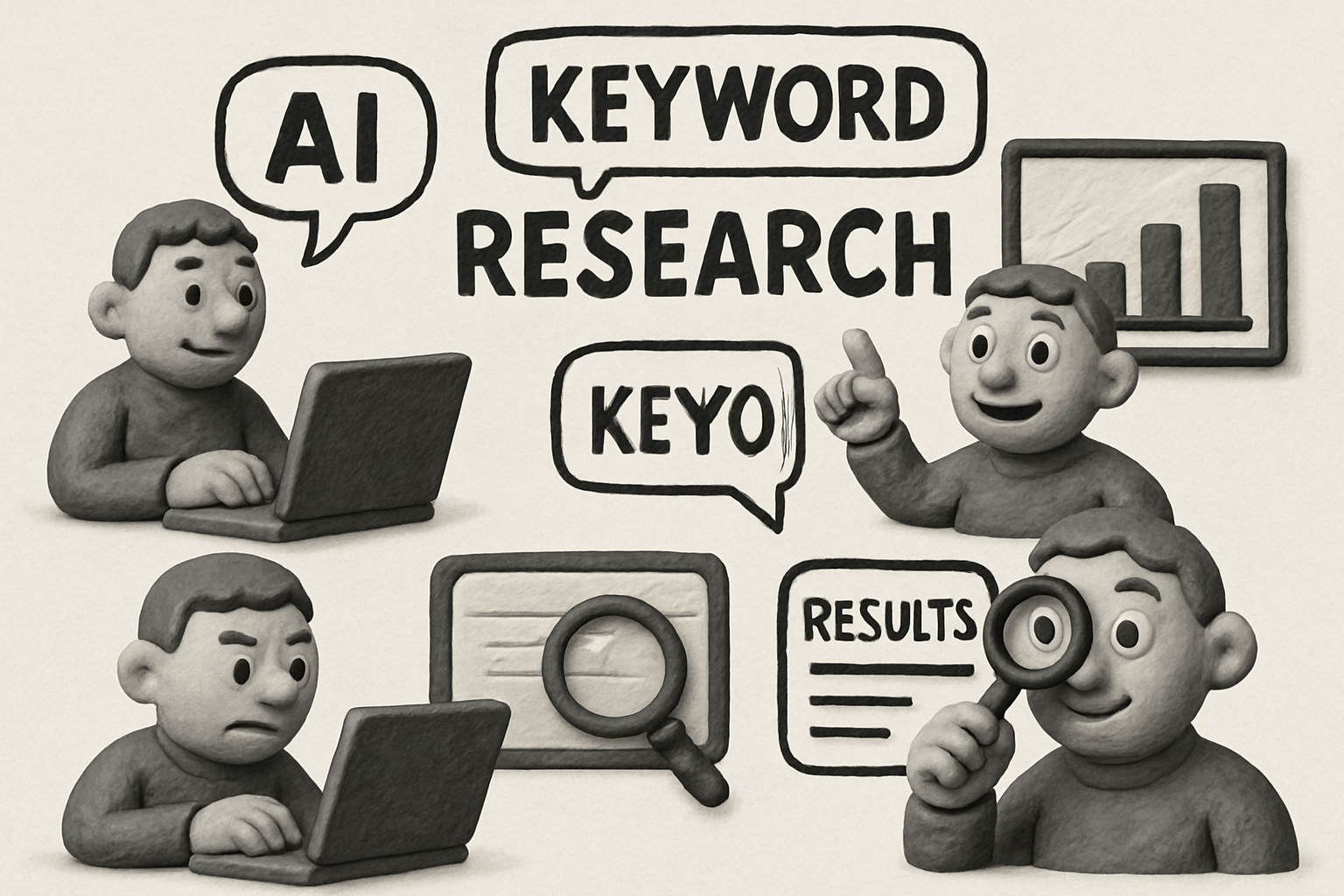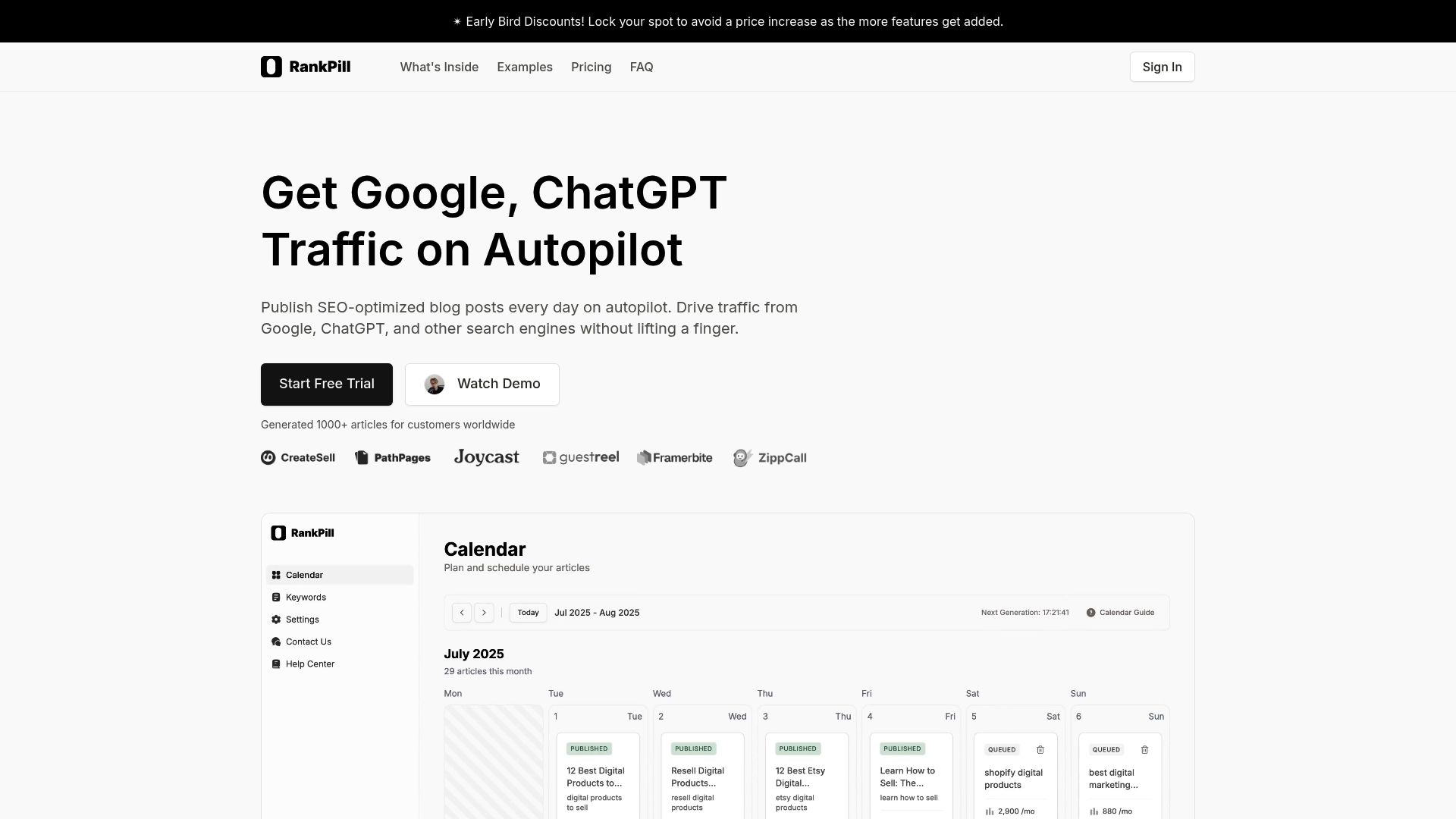Struggling to keep up with the ever-evolving world of SEO? You’re not alone—Google rolled out 729 algorithm updates in just one year, leaving many marketers in the dust.
Enter the era of ai keyword research. This innovative approach uses cutting-edge AI to automate and enhance how you find, analyze, and target keywords, giving you a competitive edge for faster rankings and smarter strategies.
In this guide, you’ll learn the fundamentals of ai keyword research, discover the top AI tools, and get a step-by-step workflow to future-proof your SEO. Ready to dominate organic search in 2025? Let’s dive in.
Understanding AI Keyword Research Fundamentals
Staying ahead in SEO means understanding the nuts and bolts of ai keyword research. Let’s break down the fundamentals, from what sets AI apart to the metrics and milestones shaping modern SEO strategies.

What is AI Keyword Research?
Ai keyword research is a modern approach that leverages machine learning and natural language processing to analyze massive datasets and uncover valuable search trends. Unlike traditional methods, which rely on manual digging and guesswork, AI-powered tools scan billions of data points to understand search intent and emerging topics.
For example, platforms like Ubersuggest and RightBlogger use AI to generate keyword ideas by analyzing real-time data. Neil Patel’s Ubersuggest, for instance, processes billions of keywords every month, providing insights that would be impossible to gather manually. This makes ai keyword research a powerful foundation for any SEO strategy.
Why AI is Essential for SEO in 2025
The world of SEO is evolving fast, with Google rolling out more than 729 algorithm updates a year. That’s why ai keyword research is now indispensable. AI adapts quickly to new ranking factors and shifts in user behavior, ensuring your strategy remains effective even as the landscape changes.
One of the standout advantages is AI’s precision in identifying low-competition, high-opportunity keywords. For example, AI can spot keyword gaps—areas where competitors rank but you don’t—unlocking opportunities that manual research often overlooks. In 2025, embracing ai keyword research means future-proofing your SEO efforts.
Key Metrics in AI Keyword Research
Getting the most from ai keyword research means understanding key metrics. These include:
| Metric | What It Measures | AI Advantage |
|---|---|---|
| Search Volume | Estimated monthly searches | Real-time, global/local |
| Keyword Difficulty | Competition for ranking | AI scoring, accuracy |
| CPC & Intent | Monetization potential | Predicts commercial value |
| Locale/Device Data | Country/device-specific insights | Hyper-targeted strategies |
Modern tools, like RyRob’s and Ubersuggest, provide country and device-specific data, helping you tailor your approach. For more on how to filter and analyze these metrics efficiently, check out Filtering and Analyzing Keyword Metrics. These insights are the backbone of a successful ai keyword research workflow.
The Evolution of SEO: From Manual to AI-Driven
SEO has come a long way, evolving from tedious manual keyword checks to streamlined ai keyword research workflows. In the past, marketers sifted through spreadsheets and relied on basic tools. Today, AI integrates seamlessly with content creation, optimization, and publishing.
Generative AI, like ChatGPT and Google SGE, has shifted SEO toward more conversational queries and dynamic search experiences. By automating research and leveraging data-driven insights, businesses can stay agile and competitive. Embracing ai keyword research is key to thriving in this ever-changing landscape.
Step-by-Step AI Keyword Research Workflow for 2025
Ready to unlock the full potential of ai keyword research? Let’s break down the process into six actionable steps. Mastering this workflow ensures your SEO stays ahead in 2025.

Step 1: Define Your SEO Goals and Target Audience
The first step in ai keyword research is setting clear objectives. Are you aiming to boost traffic, capture leads, or build brand awareness? Define your targets up front.
Next, get to know your audience. Analyze their demographics, online habits, and pain points. AI tools can segment users based on behaviors, allowing you to personalize keyword targeting for each group.
List your goals and audience traits. This foundation guides your keyword strategy and ensures every decision aligns with your business objectives.
Step 2: Gather Seed Keywords and Analyze Competitors
Start with brainstorming core topics relevant to your niche. Enter these into ai keyword research tools to generate an initial list of seed keywords.
To gain an edge, reverse-engineer your competitors. Tools powered by AI—like Ubersuggest and Ahrefs—reveal which keywords are driving their traffic. For a deep-dive and step-by-step process, check out How to Get Competitor Keywords for actionable strategies using AI.
Identify content gaps and high-performing keywords that you can target for quick wins.
Step 3: Expand Keyword List with AI Tools
Now, grow your list using advanced ai keyword research platforms. AI-powered generators suggest both broad and long-tail keywords, offering features like clustering, intent analysis, and semantic grouping.
- Discover related phrases and trending topics
- Analyze search intent behind queries
- Group keywords by topic clusters for better structure
For example, RightBlogger’s tool recommends new keyword ideas with real-time search volume and difficulty metrics, streamlining your expansion process.
Step 4: Evaluate Keyword Metrics and Prioritize Opportunities
With a robust list, it’s time to analyze the data. AI keyword research tools provide metrics such as search volume, keyword difficulty, and commercial intent.
Look for the “sweet spot”: medium search volume (1,000–5,000/month) and low competition. AI scoring systems help you identify which keywords offer the best ranking opportunities.
Rank your keywords by potential impact. Focus on those with the highest ROI and alignment with your goals.
Step 5: Map Keywords to Content and Search Intent
Effective ai keyword research means aligning each keyword with the right content type and user intent.
- Informational: Blog posts, guides, FAQs
- Transactional: Product pages, service descriptions
- Navigational: About pages, contact info
AI tools can recommend the best formats for each keyword. This mapping ensures your content meets user needs and search engine expectations.
Step 6: Integrate Keywords into Content Creation and Optimization
Finally, infuse your selected keywords into your content. AI keyword research platforms assist with generating outlines, drafting content, and optimizing on-page elements like titles, meta descriptions, and headers.
Don’t forget technical aspects—AI can automate image alt text, schema markup, and even suggest internal linking strategies.
By integrating these steps, you’ll create SEO-optimized content ready to perform in the evolving search landscape.
Essential AI Tools and Platforms for Keyword Research
Staying ahead in ai keyword research means choosing the right tools for the job. Today’s AI platforms not only automate tedious tasks but also surface insights that would take hours to uncover manually. Whether you’re a solo blogger or running an agency, the right toolkit can make or break your SEO strategy. If you want to explore how these solutions work, check out this overview of Understanding AI SEO Tools.
Ubersuggest
Ubersuggest stands out as a leader in ai keyword research, offering a suite of features that help users uncover high-potential keywords with ease. Its AI-driven insights include topic clusters, search intent analysis, and trend forecasting—crucial for adapting to rapid changes in search algorithms.
- Keyword suggestions: Billions of keywords analyzed monthly.
- Competitor analysis: See what’s working for others in your niche.
- SERP data: Monitor real-time ranking shifts.
- Content ideas: Discover new topics based on current trends.
Use Ubersuggest to track rankings and generate tailored recommendations, ensuring your ai keyword research stays data-driven and proactive.
RightBlogger Keyword Tool
RightBlogger brings free, AI-powered ai keyword research to bloggers and small businesses alike. Its intuitive interface and real-time suggestions make keyword discovery fast and effective, even for beginners.
- Metrics provided: Search volume, difficulty, country-specific data.
- Instant blog ideas: Get SEO-optimized post topics with a click.
- Difficulty scoring: Prioritize easy-win keywords.
RightBlogger’s tool excels at surfacing long-tail keywords and providing instant, actionable insights, making it a top choice for anyone starting with ai keyword research.
AnswerThePublic and Other AI Tools
AnswerThePublic transforms ai keyword research by visualizing what real users are searching for. Its AI technology clusters questions, prepositions, and comparisons, giving you a bird’s-eye view of your audience’s needs.
- Visual topic maps: See how queries connect.
- Long-tail focus: Ideal for voice search and zero-click results.
- Workflow integrations: Chrome extensions and content planning tools.
Use these platforms to structure your content around actual user intent, ensuring your ai keyword research captures every relevant opportunity.
RankPill: AI-Powered SEO Content Automation
RankPill takes ai keyword research a step further by automating the entire SEO content process. From generating personalized keyword lists to creating content briefs and publishing, RankPill delivers agency-quality results at scale.

- Personalized keyword lists: Tailored to your niche and goals.
- Competitor analysis: Identify gaps and opportunities.
- Time savings: Automate repetitive tasks—save 20+ hours a week.
- Global reach: Multi-language support for international SEO.
Small businesses and agencies leverage RankPill for scalable, hands-off ai keyword research that drives consistent growth and higher rankings.
Data-Driven Strategies to Outrank Competitors with AI
Outranking your competition in 2025 demands more than guesswork—it requires data-driven strategies and a deep understanding of ai keyword research. By leveraging the latest AI tools and frameworks, you can pinpoint gaps, target long-tail gems, and adapt faster than ever before. Let’s break down the workflow to help you stay ahead in the ever-evolving SEO landscape.

Identify and Target Keyword Gaps
The first step to dominating organic rankings is finding what your competitors are doing that you’re not. With ai keyword research, you can run competitor gap analysis to reveal keywords your rivals rank for but you’re missing. Tools like Ubersuggest, Ahrefs, and RankPill make this process seamless.
- Identify competitor URLs.
- Analyze keyword overlap and gaps.
- Prioritize low-competition, high-value terms.
For actionable advice on using AI to uncover these opportunities, check out the AI SEO Keyword Ranking Tips guide. This approach uncovers quick-win keywords and builds a solid foundation for your strategy.
Leverage Long-Tail and Semantic Keywords
Long-tail and semantic keywords are the secret sauce for faster, easier rankings. Thanks to ai keyword research, you can surface ultra-specific queries and related topic clusters that manual research would likely overlook.
AI tools analyze billions of search data points, revealing not just keywords, but also questions, phrases, and intent. For example, RyRob’s tool highlights long-tail keyword opportunities—perfect for new or niche sites.
- Focus on question-based queries.
- Group keywords by semantic relevance.
- Target clusters for topical authority.
To stay ahead, embrace the power of AI in surfacing these golden keyword variations, as explored in AI Reshaping SEO: Challenges and Strategies.
Optimize for Local and Voice Search
With voice assistants and local queries on the rise, ai keyword research must adapt. AI-driven tools can segment keywords by location, device, and even conversational phrasing, helping you optimize for both “near me” searches and natural speech patterns.
- Filter by city, region, or country.
- Analyze voice search data for question-based intent.
- Adjust content to answer conversational queries.
This local and voice-focused approach ensures your content is discoverable—whether your audience is asking Alexa or searching on mobile. The result? Stronger local rankings and higher engagement.
Continuous Monitoring and AI-Driven Adjustments
SEO is never “set and forget.” Continuous monitoring is crucial—and this is where ai keyword research shines. AI tools track keyword rankings in real time, alert you to algorithm updates, and suggest new opportunities before competitors react.
- Set up real-time rank tracking.
- Receive alerts for ranking drops or surges.
- Use AI recommendations for content refreshes.
This agile approach lets you pivot quickly and maintain your edge. By staying proactive, you’ll catch trends early and keep your SEO strategy future-proofed.
Integrate AI Insights into Content Promotion and Link Building
Promotion and link building are essential for authority. Ai keyword research doesn’t stop at discovery—it also powers outreach and internal linking strategies. AI can pinpoint high-authority sites for backlinks, suggest internal links, and even automate outreach templates.
- Identify top backlink opportunities.
- Automate internal linking for topical relevance.
- Suggest 3–5 external links per article for trust.
Integrating these AI-driven insights into your content workflow maximizes visibility and authority, ensuring your efforts translate into tangible ranking improvements.
Future-Proofing Your SEO: Trends and Tactics for 2025 and Beyond
The world of ai keyword research is moving faster than ever, and staying ahead means adapting to the trends shaping tomorrow’s SEO landscape. Let’s break down the most important shifts and how you can leverage them for long-term success.
The Rise of Generative AI in Search
Generative AI is redefining what search means in 2025. With platforms like Google SGE, ChatGPT, and Bing AI providing direct answers, the focus of ai keyword research is shifting. Now, it’s about targeting queries that trigger featured snippets and AI summaries—those coveted spots where users get instant answers.
A practical approach is to craft content that’s concise, authoritative, and structured for quick retrieval. Think of it as optimizing not just for search engines, but for AI-driven answer engines. For a deep dive into how these changes are transforming SEO, explore AI's Impact on SEO in 2025.
Search Everywhere Optimization: Beyond Google
Search is no longer confined to Google. Today’s ai keyword research must consider YouTube, TikTok, Amazon, and even AI chatbots. Each platform has its own algorithms and user behaviors, demanding a broader, more holistic strategy.
AI-powered tools now track and analyze keyword performance across multiple channels. This lets you optimize product listings, video descriptions, and even chatbot scripts—all from a single dashboard. The goal? To make your content visible wherever your audience is searching.
Personalization and Hyper-Targeted Content
AI is making search results more personal than ever. Modern ai keyword research allows you to segment audiences by location, device, and even intent, then tailor content for each group. This results in higher engagement and better conversion rates.
For example, AI can recommend hyper-targeted blog topics or landing pages based on a user’s past behavior. By leveraging these insights, you’ll ensure your content always feels relevant and timely. Learn more about future-proofing strategies in AI in SEO: Future-Proofing Content Strategy.
Building an Agile, AI-First SEO Workflow
Staying agile is crucial as the SEO landscape evolves. Embrace automation in your ai keyword research process—let AI refresh your keyword lists, monitor competitors, and suggest optimizations in real time.
A winning workflow includes:
- Regularly updating keyword targets
- Experimenting with new AI tools
- Tracking algorithm updates and adapting content accordingly
By making these practices routine, you’ll keep your SEO strategy resilient and ready for whatever the future brings.
Now that you’ve seen how AI can revolutionize keyword research and SEO strategy for 2025, why not put these insights into action? Imagine automating your content creation, outsmarting competitors with data-driven keywords, and watching your organic traffic grow—all without the usual stress and guesswork. With a platform like RankPill, you get human-like blog posts, smart keyword targeting, and a seamless workflow that saves you serious time. If you’re ready to simplify SEO and see real results, let’s take the next step together—Get Started.